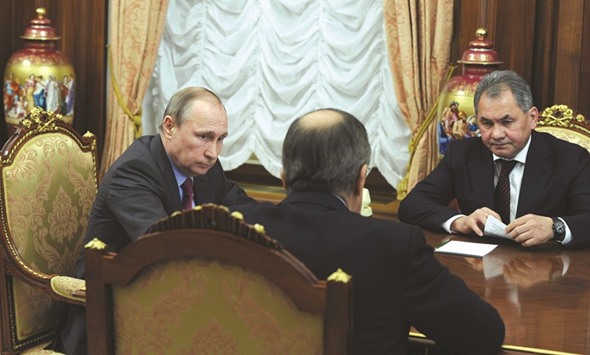President Vladimir Putin said yesterday Russian armed forces would begin pulling out of Syria and instructed his diplomats to step up the push for peace, as UN-mediated talks resumed in Geneva on ending the five-year war.
Syria said President Bashar al-Assad had agreed on the “reduction” of Russian forces in a telephone call with Putin.
Russia’s military intervention in Syria in September helped to turn the tide of war in Assad’s favour after months of gains in western Syria by rebel fighters, who were aided by foreign military supplies including US-made anti-tank missiles.
At a meeting with his defence and foreign ministers, Putin said Russian forces had largely fulfilled their objectives in the Syrian operation. But he gave no deadline for the completion of the withdrawal and said forces would remain at a seaport and airbase in Syria’s Latakia province.
One rebel group fighting Assad said Putin’s announcement was as surprising as his decision to launch air strikes on Assad’s opponents had been last year.
In Geneva, UN mediator Staffan de Mistura warned the warring parties there was no “Plan B” other than a resumption of conflict if the first of three rounds of talks which aim to agree a “clear roadmap” for Syria failed to make progress.
Putin said at the Kremlin meeting he was ordering the withdrawal from today of “the main part of our military contingent” from the country.
“The effective work of our military created the conditions for the start of the peace process,” he said. “I believe that the task put before the defence ministry and Russian armed forces has, on the whole, been fulfilled.”
With the participation of the Russian military, Syrian armed forces “have been able to achieve a fundamental turnaround in the fight against international terrorism”, he added.
Kremlin spokesman Dmitry Peskov said Putin had telephoned Assad to inform him of the Russian decision.
The move was announced on the day UN-brokered talks involving the warring sides in Syria resumed in Geneva.
In Damascus, the Syrian presidency said Assad had agreed to the reduction in the Russian air force presence after it had helped the Syrian army to make military gains. However, it added in a statement that Moscow had promised to continue support for Syria in “confronting terrorism”.
Syria regards all rebel groups fighting Assad as terrorists.
One rebel group expressed bafflement. “I don’t understand the Russian announcement, it’s a surprise, like the way they entered the war. God protect us,” Fadi Ahmad, spokesman for the First Coastal Division, a Free Syria Army group fighting in the country’s northwest, said.
A US official, who asked not to be named, said Washington had seen reports of Putin’s comments, adding: “We expect to learn more about this in the coming hours.”
Speaking before Putin’s announcement, de Mistura said Syria faced a moment of truth, as he opened talks to end a war which has displaced half the population, sent refugees streaming into Europe and turned Syria into a battlefield for foreign forces and militants.
The talks are the first in more than two years and come amid a marked reduction in fighting after last month’s “cessation of hostilities”, sponsored by Washington and Moscow and accepted by Assad’s government and many of his foes.
But the limited truce, which excludes the powerful Islamic State and Nusra Front groups, is fragile. The warring sides have accused each other of multiple violations, and they arrived in Geneva with what look like irreconcilable agendas.
The Syrian opposition says the talks must focus on setting up a transitional governing body with full executive power, and that Assad must leave power at the start of the transition. Damascus says Assad’s opponents are deluded if they think they will take power at the negotiating table.
The head of the government delegation, Bashar Ja’afari, described his first meeting with de Mistura yesterday as positive and constructive, adding he submitted a document entitled “Basic Elements for a Political Solution”.
De Mistura said some ideas had been floated in a meeting he described as a preparatory session, before a further meeting tomorrow which would focus on core issues. Asked about the gulf between the two teams, he said it was the nature of negotiations that both sides start off with tough positions.
In a sign of how wide the rift is, de Mistura is meeting the two sides separately - at least initially.
The talks must focus on political transition, which is the “mother of all issues”, the UN envoy said before his talks with Ja’afari. Separate groups would keep tackling humanitarian issues and the cessation of hostilities.
“As far as I know, the only Plan B available is return to war, and to even worse war than we had so far,” he said.
Several ceasefires and peace talks have been attempted since the conflict, which has killed 250,000 people, broke out five years ago this week.
Hundreds of UN monitors were deployed to observe a ceasefire in Syria in 2012, but pulled out after fighting resumed. Peace talks in Geneva two years ago collapsed after making no progress.

Russian President Vladimir Putin meets with Defence Minister Sergei Shoigu (right) and Foreign Minister Sergei Lavrov (centre) at the Kremlin in Moscow yesterday. Russian President Vladimir Putin on March 14 ordered the defence ministry to begin the withdrawal of Russian forces from Syria today.
